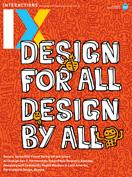Authors:
Ather Sharif
There are at least 1.3 billion disabled people worldwide [1]. Their disabilities include those involving sight, hearing, mobility, and cognition, among others. These individuals are disabled—if they choose to identify as such—but what they are not is "impaired."
Correct usage of terminology is important. There exists a prodigious, if not universal, agreement that the terminology we use to describe people holds significant weight in increasing inclusivity for marginalized groups, especially disabled people [2]. These words represent the speakers' commitment to cultural awareness and sensitivity toward vulnerable populations [3]. For the latter, they express respect and a sense of belonging to a world that continues to disenfranchise them. Much like fashion, terminologies have a shelf life, after which they slowly become archaic or are considered outdated due to their negative connotations (e.g., retarded). But unlike fashion, if declared pejorative, the terminologies' return to popular usage is unwelcome at best, unless done so purposely by the targeted demographic to reclaim the narrative (e.g., crippled and gimp).
Reclaiming the narrative. Reclaiming the narrative begins with a word being just a word, like any other word in the dictionary. Then, a creative person comes along and uses it as an adjective to describe a person or a group of people they think they are superior to. Other "superiors" agree, and the word then becomes an identity of the "inferiors." Time goes by, inferiors get a platform to vocalize their disagreement with the word, superiors demonstrate resistance and continue using it, and finally, after years of exhausting advocacy, the word gets flagged as offensive. It stays offensive, and people, within and outside the targeted demographic, avoid its usage. Then, people within the targeted demographic take ownership of the word to empower themselves, remembering the oppression they faced, which led to the association of the word with their demographic in the first place. People outside the demographic, however, are barred from using the word, particularly with those within the demographic. (The barring has never been enforced as a law, though, and only serves as a recommendation, with the likelihood of the speaker being "canceled" for using the word.)
The word impaired has not yet been reclaimed. The disagreement, however, has been vocalized. Resistance to its cessation continues.
Definition and impact of impaired. The Oxford English Dictionary defines impaired as "injured, weakened, damaged; diminished or deteriorated in amount, quality, or value." Merriam-Webster's Collegiate Dictionary describes it as "diminished in function or ability."
Disabled people already know what their disabilities and limitations are, with many having embraced it as a part of their identity. They do not need a constant reminder of their disabilities. Every time I type the word impaired for this blog post, a part of me feels dejected and wants to give up on the utopian future where disabled people are not distinct from those who are "normal." But I digress.
It makes sense to listen to the voices of those who find discomfort in being labeled as impaired.
Using words like impaired can result in disabled people internalizing their self-identity as being broken, or even an "incomplete" human. These words can foster a subconscious degradation in confidence and pose hurdles in a disabled person's journey toward accepting their identity as a disabled person. They can create emotional scars, which, if externalized, could develop into more negative stereotypes, such as disabled people being "sappy" or lacking "thick skin." The impact of these terms can be long-lasting.
Arguments for using impaired. I hesitate to believe, or rather to admit, that on a human level, HCI researchers and authors are entirely oblivious to the effect of words on human emotions. Movies, TV shows, and books thrive on this effect. Encouraging and respectful words produce harmony. Disrespectful and prickly words trigger emotional distress. Neutral words are often harmless. So why do people still use impaired to refer to people?
Argument 1: It's an established term used in medical journals and prior accessibility research. We're just following the standards. This reasoning is based on facts. Impaired is used quite extensively, although the field of medicine is attempting to rectify that [4,5]. But if we dig deeper into the literature, we will find frequent usage of other terms now considered derogatory. There was a time when those words were acceptable…and then they weren't. There are two choices: keep using impaired until it reaches its shelf life or preemptively avoid the term and be better allies to the disability community. History has a funny way of teaching us things, but only if we are willing to learn. The lesson here is to be proactive catalysts for positive change and not let the change happen as a mandatory reparations measure.
Argument 2: A person I know is perfectly fine with its usage, so this is not a problem. N = 1 has its place, but not for this argument. Everyone has their preferences; some people are sensitive, some not so much. Focusing on those not affected by the usage of impaired and letting that motivate its continued usage is arguably an invalidation of those who are sensitive to its usage. Our societal goal has always been to validate and support vulnerable and disenfranchised populations. It makes sense to listen to the voices of those who find discomfort in being labeled as impaired. It is improbable that a more accepting replacement would be unwelcomed by those not affected by the usage of impaired. At its 1993 annual convention, the National Federation of the Blind advised against the usage of visually impaired and instead advocated using blind and low vision, employing identity-first language [6]. Yet, 31 years later, visually impaired remains a widely used term.
Argument 3: I never really thought about it; I just used it because my advisor did. What can I do moving forward? This is not necessarily an argument, but it provides valuable insights into some people's thought process. The reasoning behind this view makes sense too. The desire to be better is a gold star. But some questions remain. For example: How can we better communicate our discomfort with word choices without exhausting ourselves, such that it is baked into our thought process from the start? Whose responsibility is it? How can we build a culture where we are encouraged to challenge an established belief, where there is constant learning and unlearning? I do not know the answers to these questions, but I suspect the answers involve being less resistant to change and actively seeking feedback from a community on how they wish to be referred to.
Where do we go from here? This blog post is a call to action to cease referring to disabled people as impaired. But that is not all I intend. I urge HCI researchers and authors to employ practices and processes that allow for rethinking and challenging the terms they use to refer to vulnerable and disenfranchised populations. I believe it when people say they wish to be better allies; using respectful terminology is a step toward that. Giving some thought to people-describing adjectives before using them can help. I hope this post sparks thoughtful conversations on this subject and helps identify avenues for authors to use more-inclusive words.
1. World Health Organization. Disability. March 7, 2023; https://www.who.int/news-room/fact-sheets/detail/disability-and-health
2. Sharif, A., McCall, A.L., and Bolante, K.R. Should I say "disabled people" or "people with disabilities"? Language preferences of disabled people between identity- and person-first language. Proc. of the 24th International ACM SIGACCESS Conference on Computers and Accessibility. ACM, New York, 2022, 1–18.
3. Best, K.L., Mortenson, W.B., Lauzière-Fitzgerald, Z., and Smith, E.M. Language matters! The long-standing debate between identity-first language and person-first language. Assistive Technology 34, 2 (2022), 127–128.
4. Goddu, A.P. et al. Do words matter? Stigmatizing language and the transmission of bias in the medical record. Journal of General Internal Medicine 33, 5 (2018), 685–691.
5. Raney, J. et al. Words matter: An antibias workshop for health care professionals to reduce stigmatizing language. MedEdPORTAL 17 (2021), 11115.
6. National Federation of the Blind. Convention Resolutions 1993: Resolution 93-01 https://nfb.org/sites/default/files/images/nfb/publications/convent/resol93.htm
Ather Sharif has a Ph.D. in computer science from the University of Washington. His research focuses broadly on human-computer interact ion and specifically on the intersection of accessibility, visualization, and personalization. His work involves making online data visualizations accessible to screen-reader users. He is the chairman of the Executive Board of the Disability Empowerment Center. [email protected]
Copyright held by author
The Digital Library is published by the Association for Computing Machinery. Copyright © 2024 ACM, Inc.









Post Comment
No Comments Found